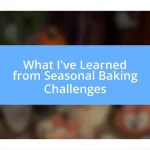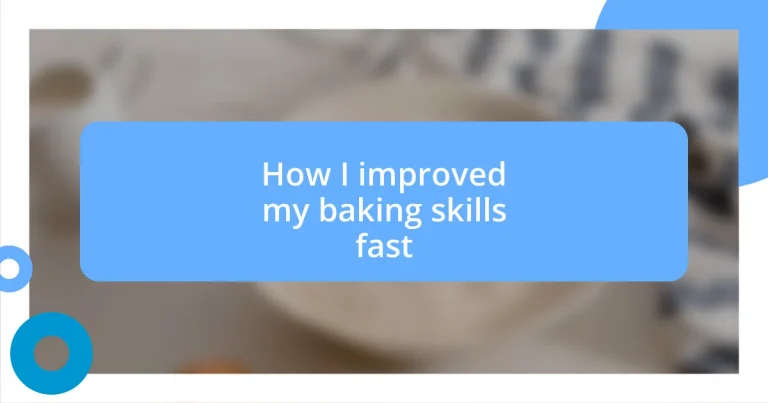Key takeaways:
- Overcoming fear of failure and embracing mistakes as learning opportunities transformed the author’s baking journey.
- Setting clear baking goals and tracking progress helped maintain focus and motivation in improving skills.
- Seeking feedback from experienced bakers fostered growth and enhanced techniques, leading to better results and deeper passion for baking.
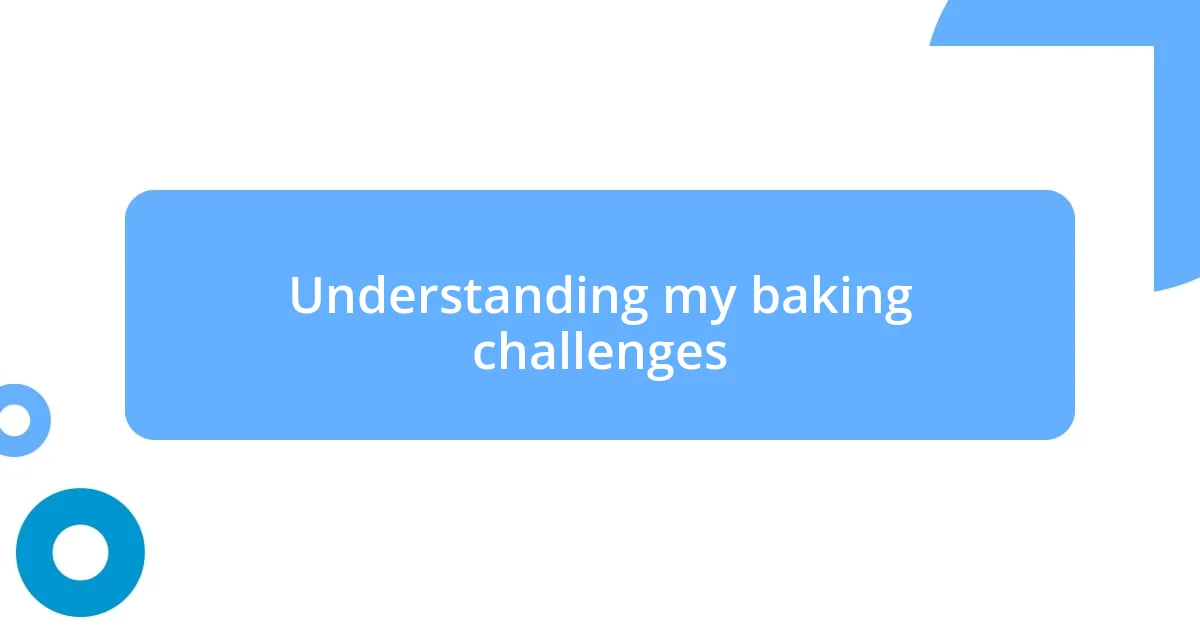
Understanding my baking challenges
When I first started baking, I often found myself overwhelmed by the sheer variety of techniques and ingredients. I remember a time when I confidently whipped up a cake, only to realize I had forgotten the baking powder. Observing my sinking cake, I couldn’t help but wonder, how did something so simple escape my attention? It was moments like these that revealed how crucial a solid understanding of the basics really is.
Another major challenge I faced was inconsistency. One day, my cookies would turn out chewy and perfect, while the next batch crumbled into dust. I started asking myself, what was I doing differently? I soon realized that often it was the little things—like the temperature of the butter or the size of the eggs—that made all the difference. This inconsistency not only frustrated me, but it also made me doubt my abilities.
The most difficult part was overcoming my fear of failure. Each baking mishap felt like a personal setback. I vividly recall burning my first batch of muffins; the smell was dreadful. Instead of giving up, I began to see these failures as opportunities to learn. I asked myself, how can I turn this experience into something positive? That shift in mindset was a turning point in my baking journey.
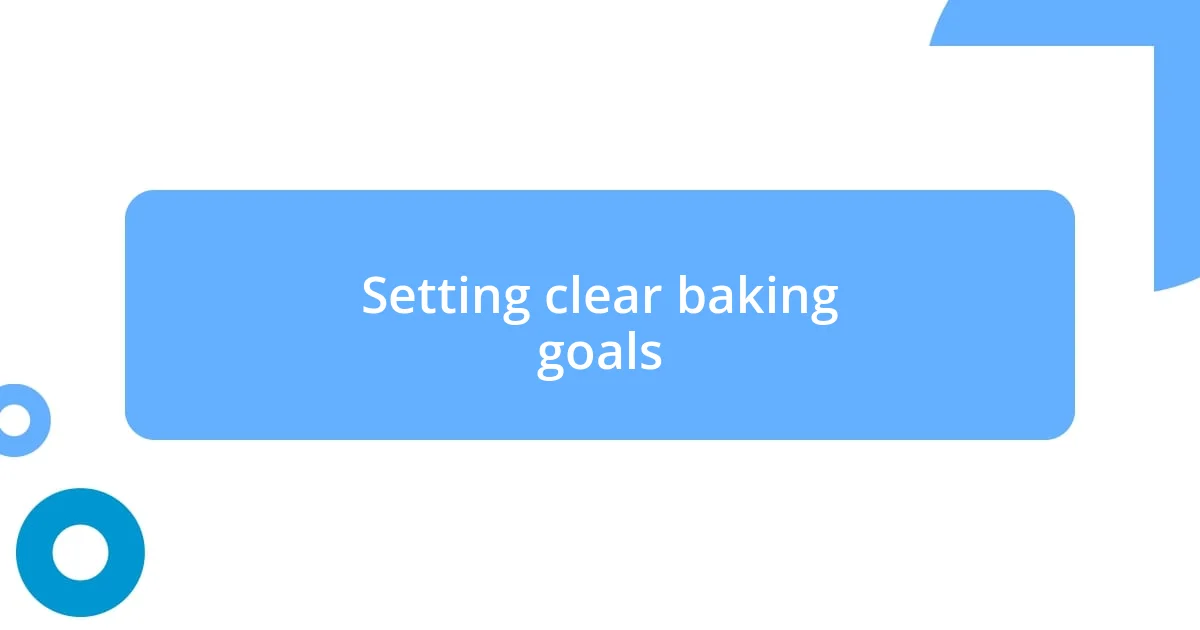
Setting clear baking goals
Setting clear baking goals is essential for tracking progress and staying motivated. Initially, I made the mistake of hopping from one recipe to another without a sense of direction. When I finally sat down and established specific goals—like improving my bread-making technique or mastering edible decorations—I noticed a significant shift in my focus. Creating actionable steps helped me channel my enthusiasm, making each baking session a fulfilling learning experience.
Here are some practical tips for setting effective baking goals:
- Identify areas for improvement: Make a list of specific baking skills you’d like to develop, such as perfecting pie crusts or learning how to temper chocolate.
- Set achievable milestones: Break down your goals into manageable tasks, like perfecting one recipe each week.
- Track your progress: Keep a baking journal to document successes, challenges, and lessons learned.
- Celebrate small victories: Acknowledge your progress, whether it’s nailing a complicated technique or simply baking something without a hitch.
By focusing on clear goals, I found the path to improvement much more straightforward, and it made the process feel less daunting. Instead of feeling overwhelmed by the vast baking universe, I was able to approach it one goal at a time.
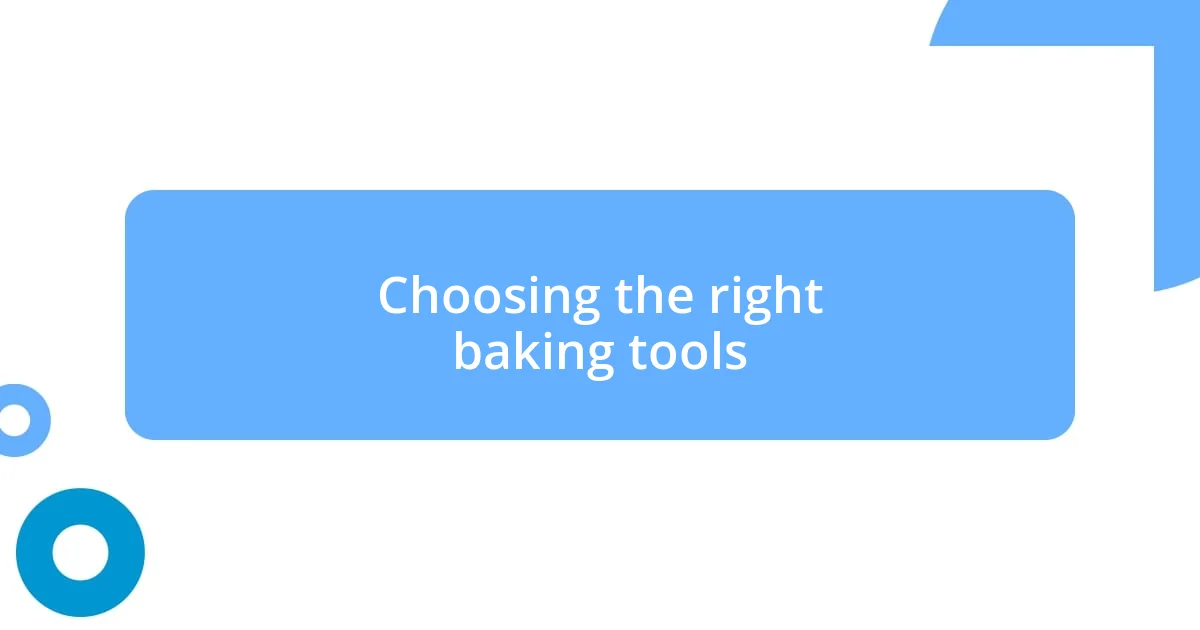
Choosing the right baking tools
Choosing the right baking tools can significantly enhance your overall baking experience. I recall my initial attempts using mismatched utensils. My wooden spoon felt like a relic, and I often found myself wrestling with a flimsy baking pan that warped under the heat. It was only after investing in quality tools that I truly appreciated how the right equipment can streamline the process and improve results. For example, a sturdy stand mixer not only saves time but ensures consistency, especially when dealing with doughs that require thorough mixing.
Once I learned about the importance of specific tools, I became more deliberate in my choices. I started by upgrading to heavy-duty baking sheets and non-stick cake pans. The joy was palpable when I could release cupcakes with ease, or when cookies baked evenly. I often share this with fellow bakers: having the right tools isn’t just about convenience; it’s about setting yourself up for success. Investing in a reliable measuring scale was another game-changer. Accurate measurements are critical in baking, as even small deviations can lead to disastrous outcomes.
In my journey to refine my baking skills, I ultimately created a checklist of essential tools. This not only helped me get organized but also guided my selections. I discovered that keeping my workspace efficient and clutter-free allowed my creativity to flow better. Here’s a quick comparison of some of my favorite tools that I found made a world of difference:
| Tool | Benefit |
|---|---|
| Stand Mixer | Efficient mixing, saves time, consistency in ingredients |
| Digital Scale | Precise measurements, prevents baking errors |
| Non-Stick Bakeware | Easy release and cleanup, more successful baking |
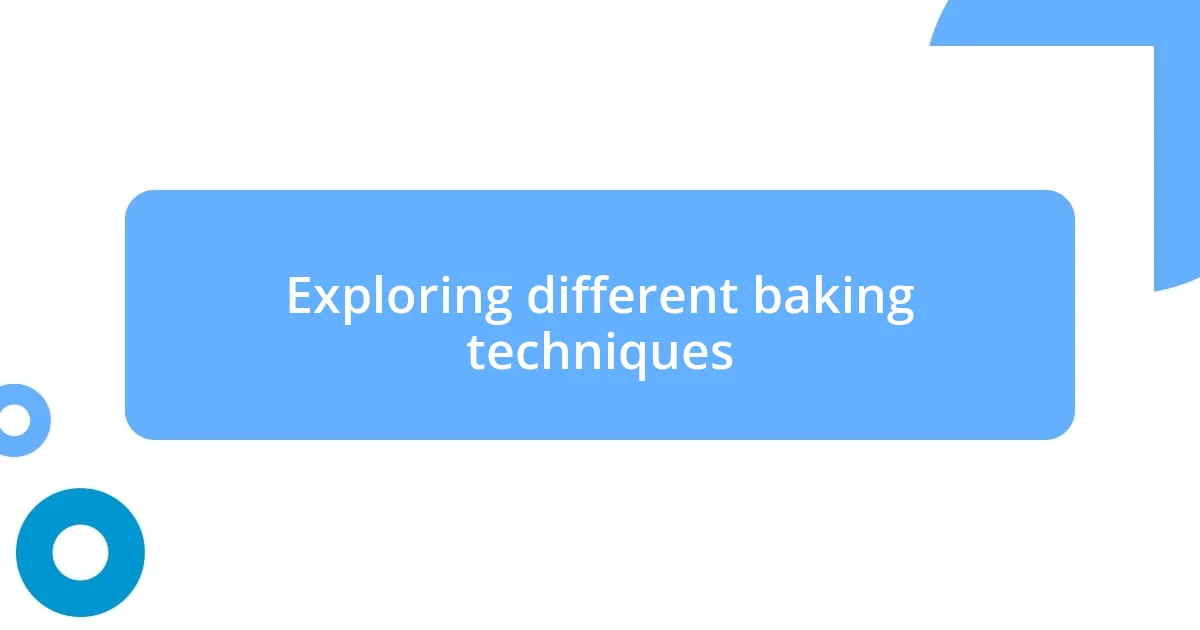
Exploring different baking techniques
Exploring different baking techniques opened up a whole new dimension for my baking journey. I remember the first time I tried the method of “creaming” butter and sugar together for cookies. It felt like magic as the mixture transformed from a dense paste into a fluffy cloud, perfectly aerated and ready to create the best cookies I’d ever made. This technique not only changed my cookie game but also made me realize how much texture plays a role in baking. Have you ever considered how different methods can alter the final product?
One day, I decided to experiment with the technique of “sifting” dry ingredients. Initially, I saw it as an unnecessary step until I noticed how light and airy my cakes turned out afterward. It’s fascinating how such small actions can have a massive impact. Just like that, my understanding of the science behind baking deepened, bringing me joy and curiosity. I found myself pondering: What if every new technique became an invitation to discover even more?
Bread-making, for instance, is an art form that can elevate your kitchen skills. When I first tackled sourdough, I was intimidated by the idea of fermentation and starter maintenance. It was a learning curve, but each attempt brought me closer to a fragrant, crusty loaf. The satisfaction of pulling a beautifully risen loaf from the oven, after so much trial and error, is an experience I cherish deeply. Have you ever felt that rush of accomplishment when mastering a technique? It’s moments like these that make all the effort worthwhile and leave you eager to explore new baking realms.
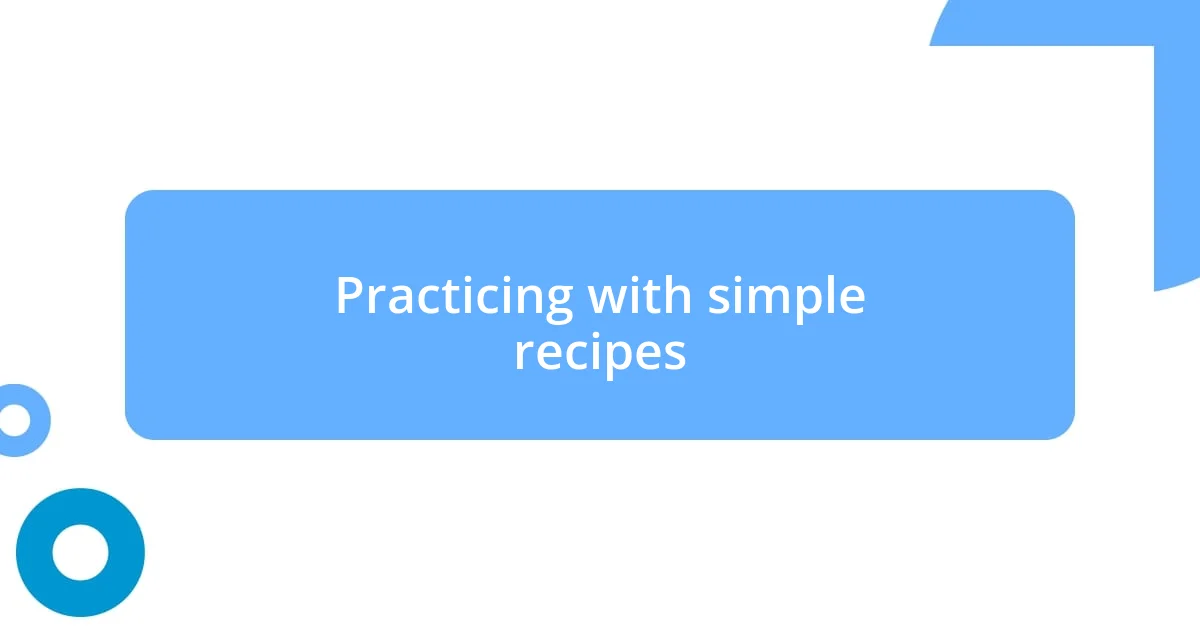
Practicing with simple recipes
When I embarked on the journey of improving my baking skills, I found that practicing with simple recipes made all the difference. I vividly recall whipping up a classic chocolate chip cookie recipe—it was almost meditative. With each batch, I honed my mixing technique, observed how temperature affected the dough, and learned the art of timing. Isn’t it fascinating how a straightforward cookie can teach you so much about baking?
Starting with easy recipes felt less intimidating and allowed me to experiment without the fear of a big failure. One weekend, I dove into banana bread, using ripe bananas that had seen better days. The simplicity of the ingredients meant I could focus on the technique—like ensuring the batter was just mixed enough. Each time I pulled a loaf from the oven, the aroma would fill my kitchen and bring a smile to my face. Have you ever experienced that moment when a dish just feels right?
As I practiced my skills with these approachable recipes, I noticed a shift in my confidence. I became more comfortable with variations—for instance, swapping pecans for walnuts or adding a sprinkle of cinnamon. These little tweaks fostered my creativity and gave me a sense of ownership over my baking. I remember thinking, “What if I could create my twist on a family classic?” It was thrilling to see how simple changes could make a recipe feel uniquely mine.
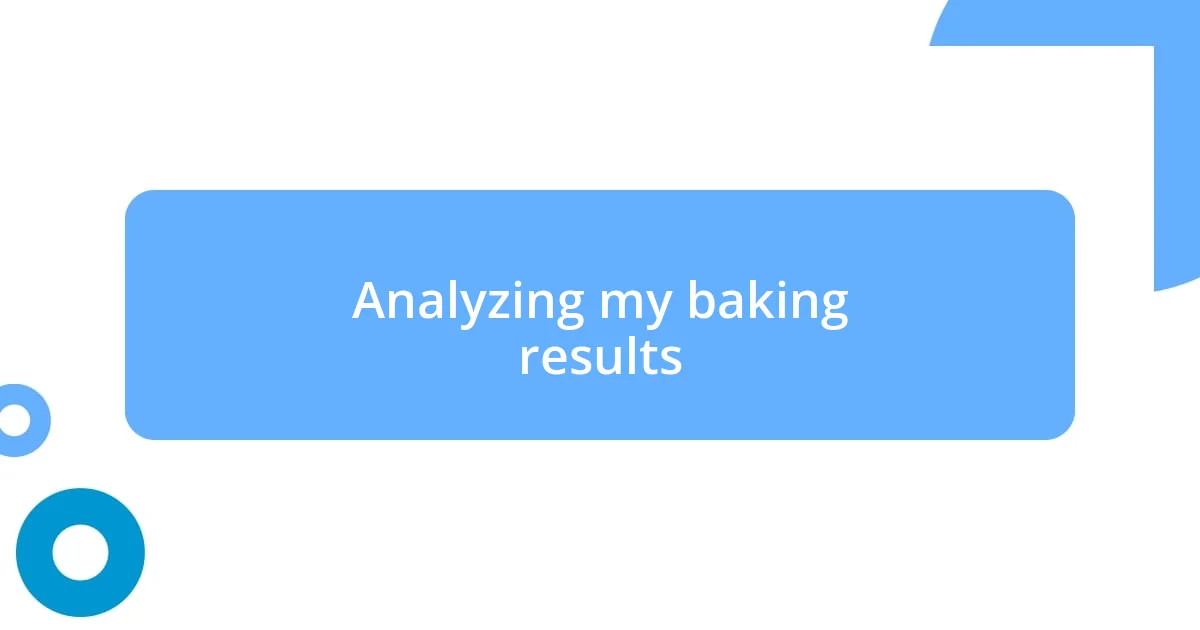
Analyzing my baking results
After experimenting with various recipes and techniques, I found it crucial to analyze my baking results critically. One time, I baked a batch of brownies that looked promising but turned out more cake-like than fudgy. I took a moment to reflect on my mixing method and realized I had overmixed the batter. It made me ponder: how often do we overlook a single step that can shift the entire texture? This experience taught me to pay more attention to the little details.
I also remember a time when I tried my hand at macarons. The first batch cracked terribly, leading to quite the mess. While it was frustrating, breaking down that outcome revealed my oven temperature was too high. I’ve learned that each failure holds a lesson, urging us to refine our approach. Have you considered tracking your baking outcomes? Keeping notes on what went right or wrong has turned into an invaluable habit for me.
Reflecting on my successes was equally rewarding. I recall proudly pulling a perfectly risen cake from the oven. It had the nice golden hue that I had aimed for, and tasting it felt like a triumph. That moment reinforced my belief that careful analysis—both of mistakes and wins—has propelled my growth. Just like in life, isn’t it fascinating how reflection leads to improvement? Each bake became more than just an outcome; it turned into a personal journey of growth and discovery.
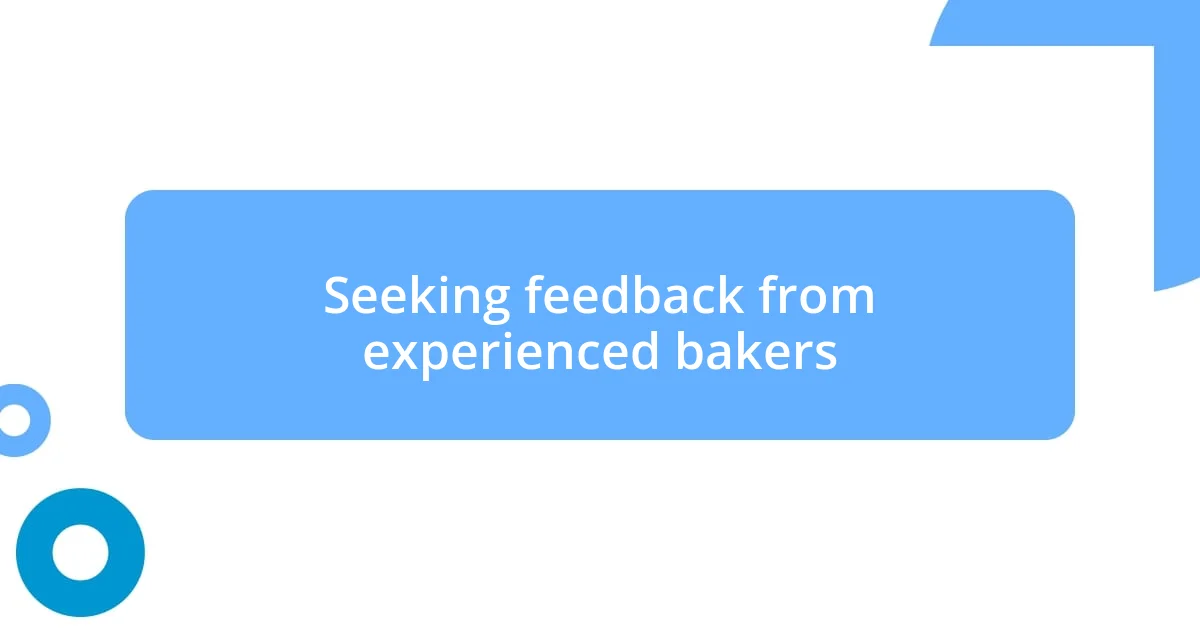
Seeking feedback from experienced bakers
Seeking feedback from experienced bakers has been a game changer in my baking journey. I remember attending a baking workshop where a seasoned pastry chef critiqued my pie crust. “It’s a bit overworked; try to be gentler with the dough,” she advised. That simple insight opened my eyes to nuances I hadn’t noticed before—who knew a light touch could make such a difference?
One of the best things about reaching out for feedback is the camaraderie it fosters. I joined an online baking community and started sharing my work. The encouragement I received on a batch of scones was uplifting, but it was the constructive criticism that truly helped me grow. A fellow baker pointed out that I needed to watch my baking times closely, leading to perfectly flaky scones on my next attempt. Have you ever felt that rush of energy from collaboration?
Asking for advice has also shaped my approach to flavors. On one occasion, I brought my lemon meringue pie to a gathering, hoping for rave reviews. Instead, an experienced friend suggested I add zest for extra brightness. How often do we think we’ve nailed a recipe only to find there’s room for improvement? The next pie was a revelation—vibrant and fresh! This taught me that even beloved recipes can evolve with insight from others. Engaging with experienced bakers not only enhances my skills but also deepens my passion for the craft.



